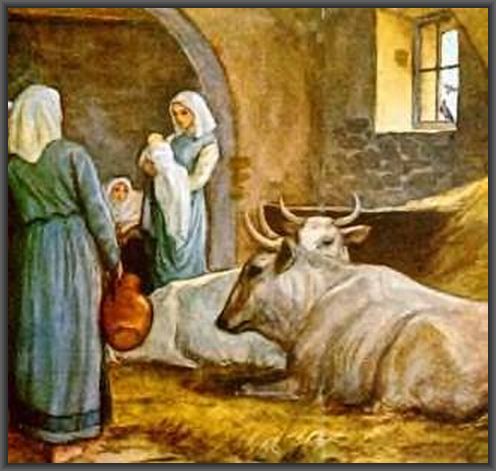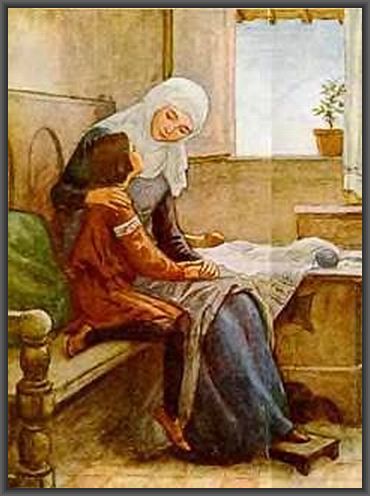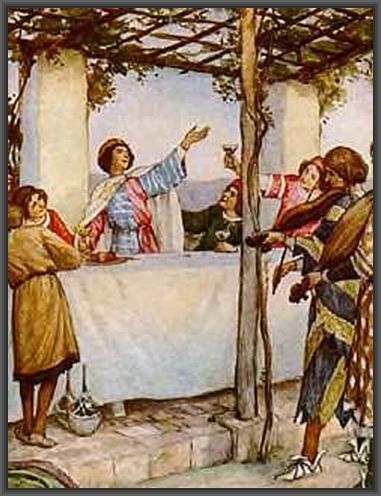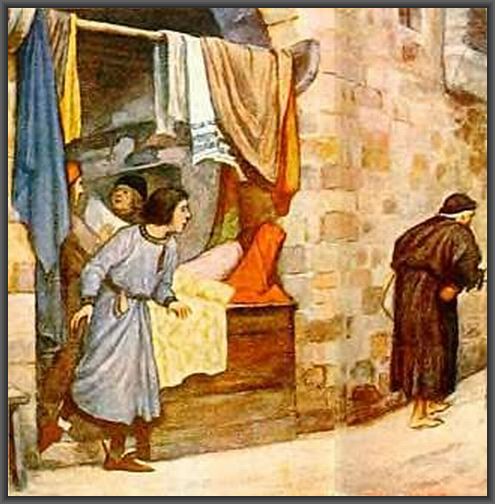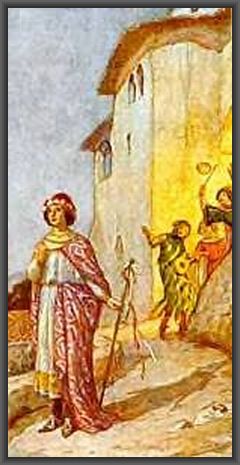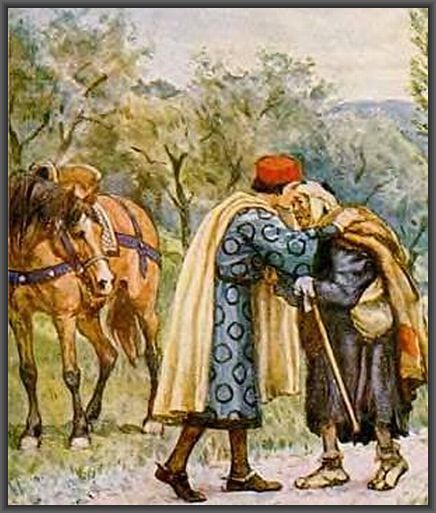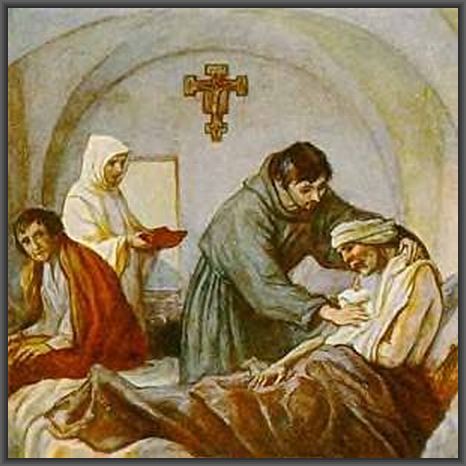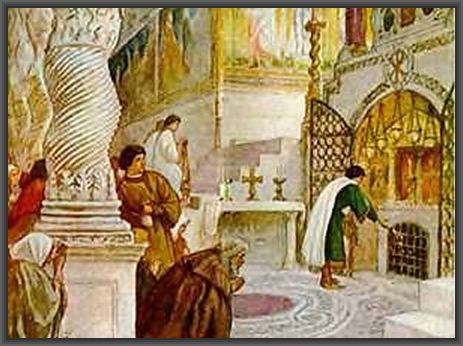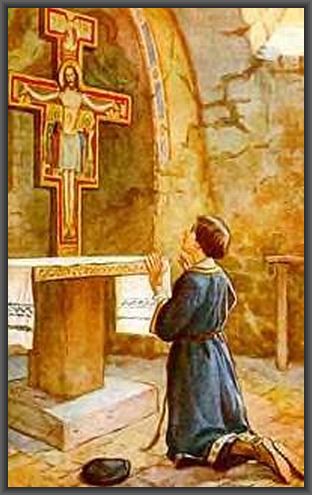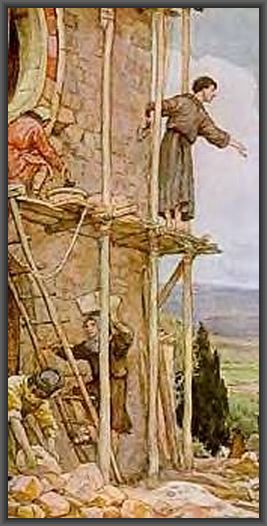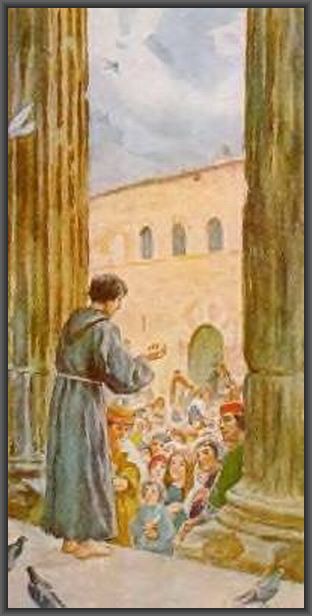by Fr. Candide Chalippe, OFM -------- With illustrations
Such a purpose must seem great to all those who can appreciate true grandeur by the light of religion. In its contempt of the goods of the world, it manifests an elevation of mind far above the ostentation of the ancient philosophers; in its deep humiliations, an heroic courage; in its extreme simplicity, the most exalted sentiments; in its weakness, and in the apparent foolishness of the cross, the strength and wisdom of God. The infidels themselves admired all this, and it will be not less meet to revive the fervor of Christians, and to increase the veneration they have always entertained for St. Francis.
He was born at Assisi, a town of Umbria, in Italy, in the year 1182, under the Pontificate of Lucius III. Peter Bernardo, his father, was a rich merchant, whose principal commercial transactions were with France. His mother, whose name was Pica, had only two sons, Francis and Angelo. The latter married at Assisi, and some of his descendants were still at Assisi in 1534.
God, who has often condescended to usher in His saints by portents, was pleased, at the birth of Francis, to give signs of what he would be during his life. For some days Pica had suffered great pains, without being able to give birth to her child, when a man, dressed as a pilgrim, came to tell her that she would only be delivered of her infant in a stable; he would be born on straw. Although this communication appeared most strange, relatives, nevertheless, acted upon it. The patient was removed to the nearest stable, where she was successfully delivered; an event which may well be looked upon, as in the intention of Providence, thereby to mark the conformity of the holy man to Jesus Christ, poor and humble; as much, at least, as the creature can be in conformity with the Creator, and the servant with the Master of the universe. This stable has been turned into a chapel, called in Italian, "San Francesco il piccolo"--"St. Francis the Little." Over the door the following words, in very old writing, are inscribed: "This chapel was the stable of the Ox and the Ass, Where Francis was born, the mirror of the world."
His mother had the name of John given to him at his baptism, his father being then absent in France. A stranger presented himself as his godfather, and he was accepted as such; whether it was that something extraordinary was perceived in this person, or that they had been struck with astonishment at the first event. The uniform tradition at Assisi is, that this stranger disappeared after the ceremony, and that he left the impression of his knees on a marble step of the altar, which is shown in the cathedral church, with the baptismal font, on which these words in Italian are engraved:--"This is the fountain in which the Seraphic Father, St. Francis, was baptized."
At the return from the baptismal ceremony, a man, who seemed to have been sent by God, as well as the other two, or rather an angel in human form, came to beg that he might be allowed to see the child and hold it. He took it in his arms, caressed it a good deal, and impressed upon its right shoulder a well-formed cross, as a mark of his consecration, recommending the nurse to take particular care of the child, not to expose him to the snares of the devils, who had a foresight that he would one day wage a severe war against them. One of these evil spirits was obliged to confess by the mouth of one possessed, whom they were exorcising, that the princes of darkness, alarmed at the birth of Francis, had tried various ways to take away his life; and it was the Saint himself who expelled this devil afterwards. These portents, marvelous as they are, are less surprising, when we consider the singular and marked favors which heaven destined for him.
His parents brought him up with great care, and he was put to study with the clergy of the Parish of St. George.
. . . . . . . . . . . . . . . . . . . . . . . .Pica teaching the little Francis
After he had acquired some knowledge of letters, he was initiated in commercial affairs, the correspondence of which necessitated his learning the French language; he acquired it with so much ease, that his father gave him the name of Francis, a name which he bore ever after.
Bernardo and Francis pursued their avocation in a very different manner. The first, with no other object than his worldly interest, thought of nothing but his profits, and had no other care than that of accumulating. Francis, who had not a particle of avarice, and had less thought of his profit than of dealing with honor, traded with nobler and more elevated feelings. But he loved the world, he frequented society, and spent a good deal in dress, festivities, and parties of pleasure.
His father frequently reprimanded him on the subject of his expenses, but his remonstrances had little effect, because he had no consideration of the value of money, and he wished to be distinguished amongst his young companions, who always considered him as their leader. His mother, who was tender and generous, had more patience with him; and she said to those who spoke to her of his profusion, that from what she remarked in his conversation, in his actions, and even in his amusements, she had reasons to hope something great when he should come to maturer years.
Indeed, in all his demeanor, excellent prognostics for the future were observable: his temper was exquisite, mild, and condescending, his manners were agreeable and very polite; he was lively, and had great good sense: he was brave, and had a strong inclination to be generous, even to give beyond his means. Although he plunged into the vain amusements of the world, there was nothing blamable in his moral conduct. By the special protection of heaven, he avoided the rocks on which youth is too often wrecked; he preserved the inestimable treasure of purity; it was also remarked that he was distressed at any licentious expressions, and never made any reply to them.
God had imprinted in his heart great feelings of compassion for the poor, which increased from his infancy, and which induced him to afford them liberal aid, so that, following the Gospel precept, "Give to every one that asketh thee," he made a resolution to give to all who should ask alms of him, and principally if they should solicit it for the love of God. This feeling for the love of God had its effect upon him, even then, notwithstanding his dissipation; he could seldom hear the expression made use of, as he has since admitted, without being sensibly affected. It having once happened to him, in the hurry of business, to turn away a poor person who had asked a charity for the love of God, his conscience smote him immediately, and he ran after the poor man, relieved him amply, and made a promise to God that he would never refuse a single individual as long as it was in his power, when an alms should be asked for His love.
He faithfully kept this promise to his death, and was of essential service in increasing the grace and love of God in his heart. What is there more likely to bring down the grace of conversion and sanctification, and increase the love of God, than the practice of works of mercy?
The amiable qualities of Francis rendered him a favorite throughout the town, where he was looked up to as the flower of the youth, and great hopes were entertained for the future in his regard. A man of simple manners, but enlightened from above, caused a still greater esteem to be entertained for him. When he met him in the streets, he spread his cloak on the ground before him, and as a reason for showing him so unusual a mark of respect, exclaimed:--"This young man will soon do great things: he will deserve all sorts of honors, and will be revered by the faithful." Francis, who was unconscious of the designs of God, did not understand the meaning of this prediction. He knew not that these honors were to be rendered him only after severe humiliations, according to the words of the Gospel. Engrossed by the affairs of the world, and attached to its vanities, he thought little of this Divine truth, and he had less taste for it; nevertheless he hoped that he should some day receive the honors which others foretold, and which God permitted him likewise to predict of himself in an affliction which came upon him.
The towns of Assisi and Perugia were at war with each other; he was taken prisoner with some of his fellow-citizens: whether it was that he had taken up arms in the service of his country, or that he was beyond the limits of the town of his commercial affairs. His captivity, however, did not affect his spirits, he preserved his cheerfulness and good humor. His companions, who were dejected and cast down, were offended at this, and upbraided him with it, saying that he might, at least out of feeling for them, disguise them, disguise his satisfaction. "I am very sorry for you" he replied, "but as to myself, my mind is at ease and I am thankful that it is so. You see me now a prisoner, but at a future period, you will see me honored by the whole world." There was one among the prisoners whose quarrelsome temper and extreme ill humor caused him to be shunned by the others. Francis entreated them to draw a distinction between his person and his defects, and to bear with him: not being able to induce them to do so, he had the charity to keep him company himself, and by his good advice, he rendered him more gentle. All were so delighted with his goodness of heart, that they sought his friendship.
Liberated from captivity, he returned to Assisi, where God visited him with a long and severe illness, which reduced him to a state of great weakness. This was to prepare his soul for the influence of grace. As soon as he could walk, he wished to enjoy the beauty and air of the country; but he failed to be pleased therewith.
He was even disgusted with what he had previously liked the most; he felt contempt for what he had before esteemed, and his own conduct appeared to him to be senseless. This change surprised him much, but it did not as yet make any alteration in his heart. The return of health renewed his attachment to the world, his ambition and vanity revived; he entertained fresh hopes of greatness, and paid once more great attention to his dress. Thus it frequently happens that when God sends illness to worldly persons with a view to their conversion, these have no other effect than momentary reflections and promises, which are soon forgotten on the return of strength. However, Francis became more and more charitable, and gave to all the poor either money or his clothes. Having met a poor and ill-clad officer who was of a noble family, he saw in him the poverty of Jesus Christ, the King of kings, and being moved to pity, he gave him the new suit of clothes he had on.
The following night God showed him in his sleep a great and magnificent palace, full of warlike arms, all marked with the sign of the cross, to give him an idea of the reward his charity was to receive. He asked whom all that belonged to; and he was answered, that the arms were for his soldiers.
Not as yet understanding the meaning of mysterious dreams, he took this as a token of the success he was to have in warlike achievements, without suspecting that the crosses he had seen had a totally different signification. At that time Walter, Count of Brienne, in Champagne, was waging active war against the emperor, in the kingdom of Naples, on the subject of the claims of his wife Alberia, the eldest daughter of Tancred, King of Cicily, who had been some years dead. Francis resolved to offer him his services, in the hope of gaining military honors. He attached himself to an officer of distinction, who belonged to the count's army, and he set out with a good retinue, after having assured his friends that he was sure of acquiring great renown.
He first went to Spoleto, and there Jesus Christ addressed these benevolent words to him during the night: "Francis, which of the two, think you, can be of the greatest service to you: the master or the servant, the rich or the poor?" "It is the master and the rich," he answered without any hesitation. "Why then," continued our Lord, "do you leave God who is the master and rich, to seek man, who is the servant and poor?" "O Lord!" exclaimed Francis, "what is it your pleasure I should do?" Jesus Christ then said to him: "Return to your town; what you have seen signifies nothing but what is spiritual. It is from God, and not from man, that you will receive their accomplishment."
The very next morning he retraced his steps towards Assisi, to await the orders of the Lord, without troubling himself as to what the world should say as to this precipitate return.
His friends came as usual to propose a party of pleasure. He received them, as was his custom, with great politeness, and feasted them magnificently to bid them, thus honorably, an eternal adieu. On parting from them, he found himself suddenly struck with the vanity of all terrestrial things, and with the grandeur of all that is heavenly, by a communication from the Spirit of God, full of mildness, but so internal, and so forcible, that his senses were brought into a state of inaction, and he himself remained motionless. He afterwards told his confessor, that, if he had been torn to pieces in this state of rapture, he would not have felt it; that, in that moment, he could only feel at the bottom of his soul. The company, quite alarmed, drew near him; and when he had recovered his usual serenity, they enquired of him, laughing, what had occasioned his extraordinary reserve; if, perhaps, he was not thinking of taking a wife? "It is so," he replied: "I shall take one, but one so noble and so beautiful, that such another will not be found in the whole world." Evangelical poverty, which he afterwards embraced, was the spouse to which the Holy Ghost inspired him to allude.
After this divine favor he disembarrassed himself as much as possible of his commercial affairs, to beg of God to know what He would have him do; and he usually went to pray in a grotto with a confidential friend, who left him there in entire liberty. The frequent recourse to prayer excited in his heart so ardent a desire for the celestial country, that he already looked upon everything that was earthly as nothing. He felt that this happy disposition contained a treasure, but he did not as yet know how to possess himself of the hidden prize. The Spirit of God merely insinuated to him that the spiritual life, under the idea of traffic, must begin by a contempt of the world,--and under the idea of warfare, by a victory over self.--All spirituality not based upon these two Divine lessons, will never have anything solid in it.
Francis had soon occasion to put these lessons in practice. As he was riding across the plains of Assisi, he perceived a leper coming straight to him. At first he felt horror-stricken, but calling to mind that he had formed a resolution to labor to attain perfection, and that, in order to be a soldier of Jesus Christ, it was necessary to begin by obtaining a victory over self, he dismounted, kissed the leper, and gave him an alms.
When he again mounted his horse, he no longer saw any one, though he looked all round the plain. Filled with astonishment, and transported with joy, he fell on his knees to thank God, and formed a firm resolution to aim at still greater perfection. This is the effect of generous and courageous efforts, they draw down fresh graces, and reanimate our courage. He acquired also more inclination for retirement, he had no longer any liking but for solitude, for those places which were adapted to the holy sorrow of penance, where he unceasingly addressed himself to God in fervent prayer, accompanied by lamentations, which cannot be described: God at length favorably heard him.
His fervor daily increasing, insomuch that he was wholly absorbed in God, Jesus Christ appeared to him as if attached to the cross. His soul, at this stupendous scene, was wholly penetrated, and, as it were, dissolved, and the image of his crucified Savior became from that time so strongly and intimately imprinted on his heart, that every time it recurred to his mind, he had a difficulty in restraining his sobs and tears.
In this marvelous apparition he was made aware that these words of the Gospel were personally addressed to him: "If any man will come after Me, let him deny himself, and take up his cross and follow Me." He received from them that foretaste of poverty and humility which became his characteristics, and so ardent a charity inflamed his heart, that he had the courage to devote himself to the service of the lepers. Before this day they were so much his horror, that, far from allowing them to be in his presence, as soon as he saw them, at whatever distance, he turned away from them, and if they were near he passed on quickly, holding his nose. But for the love of Jesus crucified, who was pleased to represent Himself to the Prophet Isaias under the despised figure of a leper, he lowered himself to attending upon them in their hospitals, where, having abundantly supplied them with alms, he made their beds, dressed their sores, and performed for them the most abject services; he often even kissed their hands and heir faces with great feelings of commiseration.
The words which our Savior one day addressed to him while at prayer, stimulated him to continue this charitable exercise, notwithstanding his natural repugnance: "Francis, if thou desirest to know My will, thou must despise and hate all that thou hast loved and wished for till now. Let not this new path alarm thee, for, if the things which now please thee must become bitter and distasteful, those which now displease thee, will become sweet and agreeable." Shortly before his death he declared that what had seemed to him most bitter in serving the lepers, had been changed into what was pleasing both for soul and body; and all those who strive to overcome themselves for the love of God feel, as he did, that the severest practices are soon softened down by the unction of grace.
The sight of Jesus Christ fastened to the cross made him feel the misery of the poor so intensely, that he would have wished to employ all he had, and his own person, in their relief. Sometimes he did strip himself to clothe them; and when he had not enough to satisfy them all, he unsewed or tore his clothes to divide among them. In the absence of his father he caused much more bread to be brought to table at their meals than was necessary; and when his mother asked the reason, he said, "that it was in order to give more quickly to those who came to ask for food." This pious mother saw with pleasure the charity of her son; and far from endeavoring to check it, she was not displeased at his leaving her alone at table, while he took to the neighboring sick the viands of which he stinted himself. An equally lively and respectful zeal induced him to come to the aid of such priests as were in want; he took particular care to provide for the decoration of the altars, in order the better to assist at the divine service. He bought the finest linen, and distributed it to the poor country churches to be employed at the sacrifice of the mass; and when this august sacrifice was about to be celebrated, if anything was wanting, or if the altar was not properly found in everything requisite, he would offer himself to the officers of the church, in order to supply what was required either from his purse or by his personal assistance.
But all these good works did not come up to what he had figured to himself as requisite for perfection. He could have wished to withdraw into some distant country, there to practice voluntary poverty, which had already inflamed his heart. At first he resolved to go to Rome, to visit the tomb of St. Peter, moved by that grand devotion which God has often inspired in His saints, and which has been so frequent since the fourth century. He also proposed to himself to solicit from the Almighty, by the intercession of the Prince of the Apostles, the grace to carry out the resolution he had come to of leading an Apostolic life. After having recited his prayer in this holy place, he noticed that in the crowd of people some made but a slender offering, while others made no donation whatever. "What then," said he, "is devotion grown so cold? How is it that men do not offer all they have, and do not even offer themselves on a spot where the ashes of the Prince of the Apostles repose? How does it happen that they do not decorate with all possible magnificence this Peter, on whom Jesus Christ has founded His Church?" He contributed to the best of his power, leaving a considerable sum for that purpose; and what he had wished was subsequently executed.
The Sovereign Pontiffs, and in particular Sixtus V, who was a religious of his Order, have rendered the Basilica of St. Peter so sumptuous and magnificent, that it is now the admiration of the universe.
On going out of the church, he saw a multitude of poor, whom he immediately joined, as much for the affection he had for them, as for the love of poverty. He gave his clothes to him who appeared to be the most necessitous.
The following day, having dressed himself with propriety, he set out on his return to Assisi, praying God to guide him in the ways of holy poverty.
The devil, who was sensible that the young man would become confirmed in his intention if he persevered in prayer, appeared to him under a most terrific form, and threatened him, if he persisted, to render him a dreadful deformity like unto an old woman of the town, who was so hideous that he could not even look at her. But the newly-enlisted soldier of Jesus Christ, who began to be inured to warfare, laughed at the threats of the tempter, and was more urgent in his prayers, for which purpose he chose underground places, where he could better defend himself against the snares of his enemy. The fruit of these holy exercises was a lively sorrow for the use he had made of the first years of his youth, and a great perseverance in the mortification of his senses, in order to bear the cross of Jesus Christ in his body, as he bore it in his heart.
It was thus that Francis acted before having changed his habit, or quitted the world. St. Bonaventure says that he had then no other master from whom he received instructions than Jesus Christ; nevertheless, an author quoted by Wading, assures us that he sometimes consulted the Bishop of Assisi. We may here say, in order that there may be no seeming contradiction between the two, that he received instructions from Jesus Christ only because he was inspired by Him, but that he communicated with the bishop on the points on which he had been inspired; and we may be the more assured of this, as we shall see hereafter that this prelate had his confidence, and that there is reason to think that he was his spiritual Father.
The servant of God, walking and meditating one day out of Assisi, near the church of St. Damian, which was very old and falling into ruin, was moved by the Holy Spirit to enter it to pray. There, prostrated before the crucifix, he repeated three times the following beautiful words, which gave him great interior consolation, and which he subsequently made frequent use of: "Great God, full of glory, and Thou, my Lord Jesus Christ! I entreat you to enlighten me and to dispel the darkness of my mind, to give me a pure faith, a firm hope, and an ardent charity. Let me have a perfect knowledge of Thee, O God! so that I may in all things by guided by Thy light, and act in conformity to Thy will." He cast his eyes, filled with tears, upon the crucifix, when a voice came forth from it, and he heard distinctly these words repeated three times, not interiorly, but loudly pronounced: "Francis, go and repair my house, which thou seest is falling into ruin." So wonderful a voice, in a place where he was alone, alarmed him greatly, but he felt immediately the salutary effects of it, and he was transported with joy.
The sense of these words chiefly related to the state of the Church which Jesus Christ had purchased at the price of His blood, which the holy man was to repair in all its defects by his ministry and the labors of his disciples, according to the explanation which the Holy Spirit gave to him of them subsequently, which he communicated to his brethren, as St. Bonaventure tells us.
Nevertheless, the powerful protection which he received from heaven for the repair of the church of St. Damian, was an indication that the same words were to be understood to relate to that building also: as the sacred oracles had a twofold literal sense in the mouths of the Prophets, one of which related to events which were at hand, and the other to a distant time, and to mysteries wholly spiritual.
Francis came to himself; he left the church fully resolved to undertake its repair, and left money in the hands of a priest named Peter, who did the parochial duties of it, to keep a lamp burning before the crucifix, promising to give more, and to employ all he had for the use of this holy place.
The voice which had issued from the crucifix renewed in his mind and heart the impression of the mystery of the Passion. He felt himself interiorly wounded through the wounds of Jesus Christ, and he shed such burning tears, that his eyes were quite inflamed, and, as it were, full of blood, when he returned from prayer. To make his body participate in the sufferings which penetrated his very soul, and to punish himself for the levities of his youth, he imposed on himself a very rigorous abstinence, with various other kinds of mortification.
The eagerness he felt to commence the repair of St. Damian's church, suggested to him means by which the work might be begun. After having fortified himself by the sign of the cross, he took from his father's stores several pieces of cloth, which he sold at Foligno, together with his horse. He came back on foot, and offered the money respectfully to the priest of St. Damian for the repair of the church, and in aid of the poor; humbly entreating him to allow him to remain some time with him. The priest consented to receive Francis, but refused the money, fearing the displeasure of his father; and Francis, who had utter contempt for money, not valuing it more than so much dust, when it was of no use for good works, threw it upon one of the windows of the church.
St. Bonaventure calls the sale of the cloth and of the horse a fortunate bargain. And, indeed, without going into the right which the son may have had in the commercial affairs of his father, in consequence of their partnership, and of his age of twenty-five, had he not reason to think that, having received orders from heaven to repair a church, God, who is the Master and Dispenser of all goods, permitted him to employ a portion of the goods which were under his paternal roof, since he had no other means of obeying the injunction? But it is an extraordinary case, which must not be drawn into precedent. The general rule of Christian morality is, that children may not dispose of anything without the permission of their parents even under the pretext of piety.
Bernardo on his return from a journey, having heard what his son had done, came in great wrath to St. Damian's with several members of his family; and Francis, who had not yet sufficient strength of mind to encounter the storm, and wished to avoid the first ebullition, went and hid himself in the priest's room. Three contemporary authors assure us that, having placed himself behind the door, and pressing himself against the wall, when the door was opened he was miraculously let into the wall, so that he was not seen by those who were looking for him. When his father was gone, he retired secretly into a cavern, which was known only to one servant, from whom he received what was necessary for his immediate sustenance, and where he occupied himself in continual prayer, shedding abundance of tears, in order that he might be delivered from those who pursued him, and be able to accomplish the work which God had inspired him to undertake.
After having passed a month in this place, he considered that it was in God alone that he ought to hope, without putting any confidence in his own exertions, and this thought filled him with interior joy, and raised his depressed spirits. Reproaching himself, therefore, with his pusillanimity, he left his cavern and went straight to the town, as a soldier, who, feeling ashamed of having fled, returns intrepidly to the charge. Of what is not he capable, who is fully persuaded that he can do nothing of himself towards his salvation, but that he can do all through God who imparts strength to him? On these two principles the saints have undertaken, and carried into execution, the greatest things.
The inhabitants of Assisi, who saw his face all pale and wan, and who remarked how changed were his conversation and opinions, thought that his mind was disturbed. He was called a madman, they threw mud and stones at him, and followed him, hooting and calling after him.
But, without paying attention to these insults, and being on the contrary well pleased to bear these marks of the holy folly of the cross, the servant of God continued his way as if he had been deaf and insensible. Bernardo being told that his son had returned, and was made the object of public derision, went immediately in pursuit of him, reproached him bitterly with his conduct, seized him and dragged him to his house, where he beat him severely, and confined him in a hole under the staircase. This severity had no effect in shaking the resolution of the holy prisoner; he even acquired more firmness, and encouraged himself to suffer by the words of the Gospel: "Blessed are they that suffer persecution for justice' sake, for theirs is the kingdom of heaven."
A short time after, when his father was on a journey, his mother, who did not approve of the severity with which he was treated, and who moreover had no hope of overcoming his constancy, set him at liberty. He gave thanks to God for it, and made use of it, to return to the church of St. Damian. Bernardo, not finding him in his confinement at his return, was not content with upbraiding his wife in the severest terms, but went off to St. Damian's to drive him out of the country if he should not succeed in bringing him back. Francis, to whom God had given strength, presented himself boldly to his father, and told him decidedly that he cared not for his blows, nor for his shackles--that he was prepared willingly to suffer all sorts of evils for the name of Jesus Christ. His father, seeing that there was nothing more to hope in his case, thought of nothing further than to get back the money for the cloth and the horse. He found it in the window where Francis had thrown it, when the priest refused its acceptance, and then his wrath was somewhat appeased.
Avarice, which is never satisfied, induced Bernardo to believe that his son had other money, and he had him summoned before the city magistrates, to account for it. Francis appeared before their tribunal and told them that he had changed his state of life, that God had delivered him from the slavery of the world, and that he had nothing more to do with its affairs. The magistrates, who knew his conversion and his perseverance, saw something grand in his demeanor, and told his father, who urged them to put interrogatories to his son, that this affair ought to be carried into the bishop's court. Bernard addressed himself to that authority, not only to compel his son to give up what money he had, but to force him to renounce his claims to any paternal inheritance. Francis, who was a sincere lover of poverty, cheerfully consented to all that was required of him, and said that he would willingly appear before the bishop, who was the pastor and father of his soul. As soon as he was there, without waiting for his father to make his demand, and without saying anything himself, he gave up what money he still had, and then stripped off his clothes, even to his shirt, under which it was seen that he wore a hair-shirt, and gave them up to his father, addressing him in the following beautiful words: "Until this time I have called thee father on earth; but from henceforward I may boldly say, Our Father who art in Heaven, in whom I have placed all my treasure, and all my confidence."
The prelate, who was a man of great worth, admiring this excess of fervor, and moved even to tears, rose up, and embracing the servant of God, covered him with his cloak, and ordered his servants to bring such clothing as was necessary for him.
It was no doubt by a dispensation of Divine Providence that a bishop pressed to his bosom him who was to combat so strenuously for the service of the Church. They brought an old cloak belonging to a laborer, who was in the employ of the bishop, which Francis received with great satisfaction, and with which he clothed himself, making on it a cross with some mortar which he met with accidentally; thus manifesting what he wished to he, a half-naked poor one, and a crucified man. This occurred in the year 1206, when he was in his twenty-fifth year. St. Bonaventure, who gives the name of spiritual intoxication to the admirable fervor with which he stripped himself in order to be able to follow Jesus Christ nailed on the cross, says that, moreover, in order to avoid the shipwrecks of the world, he fortified himself with the representation of the wood which was the instrument of our salvation.
Emancipated from the ties of worldly desires, as he had wished to be, he now sought for some sequestered spot, where alone and in silence he might listen to the voice of God. In a wood, through which he was passing, singing the praises of God in the French language, some thieves surrounded him and asked him who he was. "I am the herald of the great King," he replied, in a prophetical sense, with perfect confidence in God. On receiving this answer, they beat him cruelly, threw him into a hole that was full of snow, and ridiculed the title he gave himself.
When they had left him, he again began to sing the praises of God in a louder voice than before, delighted to have had an opportunity of suffering. At a neighboring monastery, where he implored alms, which he received as a contemptible beggar, they employed him for some days in the vilest affairs of the scullery.
But seeing that this interfered too much with his spiritual exercises, he came to Gubbio, where one of his friends, having recognized him, gave him, in order that he might be more decently clad, a hermit's dress, a short tunic, a leather girdle, shoes, and a staff. In this penitential habit, he subjected his body to additional austerities; and in order to fulfil all the functions of humility, to which he was much attached, he devoted himself to the service of the lepers. He was constantly seen in their hospitals, moving about in all directions to aid them, preventing all their wants, showing the greatest compassion for them, washing their feet, cleansing their sores, removing the matter, and, by a wonderful effort of charity, kissing their disgusting ulcers. He received from God in reward the gift of healing; and this was a figure of the Evangelical cures, which he was soon to apply to the diseases of the soul.
Among many proofs which St. Bonaventure adduces of his having the gift of healing miraculously, he mentions that of a man of the Duchy of Spoleto, whose mouth and cheeks were eaten away by a dreadful cancer, and for whom all sorts of remedies had been fruitlessly employed. This man met Francis returning from Rome (whither he had been to implore the assistance of the blessed Apostles), who, out of great respect, wished to kiss his feet; this the humble Francis prevented, but kissed the cancerous face, which was instantaneously cured. The same saint remarks: "I know not which is most to be admired, such a kiss, or such a cure!" The servant of God, who now acknowledged no other country than heaven, and who was fearful of being the cause of some of his father's violences, proposed to himself to take up his abode in Gubbio and devote himself to the exercises of charity, without returning to Assisi; but calling to mind the order which had been given him by the voice which came from the crucifix, to repair the Church of St. Damian, he thought himself bound to obey it, at least by "questing" for what was requisite for working at it. The profound humility which he had acquired by the degradations he had subjected himself to, gave him the courage he required for begging in his native town, where he had been known to have possessed everything in plenty. Having cast aside all bashfulness for the love of Jesus Christ poor and crucified, he went through the centre of Assisi as one inspired, publishing the glories of God, and soliciting stones for the repair of the church; addressing his fellow-citizens with simplicity, thus: "Whosoever will give me a stone, shall have a reward; whoever will give two shall have a double reward; and he who gives three shall be rewarded threefold."
Many treated him with contempt, and turned him into ridicule. Others could not understand how a young man of a good and opulent family, with excellent prospects, hitherto considered as the model of the young men of the place, could demean himself to such a degree as to beg in his native town. Some thought that such a change could only come from God, and were greatly moved by it. But the new-made pauper, having no respect for the opinions of men, and receiving cheerfully the insults put upon him, after the example of Jesus Christ, thought of nothing but the church of St. Damian, for which he quested so successfully, that many persons, moved by his exhortations, furnished sufficient for its repair. He himself worked at it daily, and carried the materials on his shoulders as a common laborer, without any regard for his body, which was emaciated by the rigors of penance and fasting.
The priest of St. Damian took compassion on the pious workman, and took care to provide him with a substantial meal when he came in from work. Francis having received this charitable succor for some days running, reflected on his situation, and said to himself as he afterwards told his disciples: "Will you find everywhere a priest who has so much consideration for you? This is not the sort of life you have chosen: go, then, henceforward from door to door, as a poor man, and solicit food for the love of God, with an empty plate, on which you will put whatever may be given you. For it is thus you must live for the love of Him who was born poor, who lived poorly, whom they affixed naked to the cross, and who was put after His death into another man's tomb." One must be very dead to self, have great contempt of the world, and a sincere love of God, to entertain such feelings and carry them out.
The following day he took a plate, and went begging from door to door, and sat down in the street to eat. At the first mouthful he took of this disgusting mess, he felt a nausea in his stomach, which made him recoil. Animated at the same instant by the love of poverty, he became ashamed of his weakness, and reproached himself for the feeling; after which, he ate the remainder without reluctance, and with so much relish, that he thought he had never eaten a better meal.
He also felt an interior joy and strength in his body, which enabled him to bear with pleasure, for God's sake, whatever might be most severe or bitter. After having returned fervent thanks to the Father of the poor, who had given him so wonderful a taste, he went to the priest and entreated him to take no further trouble with respect to his nourishment, "because," he said, "I have found an excellent purveyor, and a very able cook, who can season his dishes in a superior way." He often used such jocose expressions, which were as much the effect of the spiritual joy he felt, as of his natural lively and joyous turn of mind.
Bernardo, vexed in the greatest degree at seeing his son begging and exposed to the jeers of the public, was inflamed with anger, and either turned from him when he met him, or cursed him. Francis admitted that these curses affected him more than any other suffering he endured, and he hit upon a method of protecting himself. It was to take another poor and miserable man with him, who should be as a father to him. He was engaged to bless Francis, making the sign of the cross on him whenever his father cursed him. Francis then said to Bernardo: "Believe me, my father, that God can give me, and indeed has given me, another father, from whom I receive blessings for your curses."
His brother Angelo, a young man full of the love of the world, also mocked him, and turned him into ridicule. Seeing him one day in church shivering with cold in his poor hermit's dress, and praying devoutly, he said to one of his friends: "Go and ask him to sell you a little of his sweat!" Francis replied, "I do not choose to sell my sweat to men; I can sell it at a better price to God." If all Christians thought thus, they would not suffer much pain for the world, which pays so ill, and they would do much for God, who rewards so magnificently.
The pauper of Jesus Christ gained many other victories over himself in the quest he had taken upon himself for the building of St. Damian. He suffered with admirable patience the persecution of some worldly persons, who treated him as a fool, and insulted him in a thousand ways. Every time that it happened to him to blush when he met any of his acquaintances or friends, he reprimanded himself as if he had committed some great fault; he humbled himself the more, and begged for alms more submissively, to take down all influence of pride. One day when he was begging for oil for two lamps which he wished to keep constantly burning before the crucifix, from which the miraculous voice had been heard, he went into a house where some persons of his acquaintance were collected together for gaming. Their sight struck him, and gave him a feeling of shame which induced him to retire. He had scarcely left the door, when, thinking on what he had done, he considered himself guilty of a great want of firmness, and he immediately returned to the place where they were at play, he acknowledged his fault before all present, and begged boldly for the lamps of the church in the French language, which set the company into an immoderate fit of laughter. Such efforts show the truth of the remark of St. Ambrose: that the saints were no less liable than ourselves to fall into faults; but that they had greater care to practice virtue, and to correct the faults into which they fell.
Pious and well-thinking persons remarked that the conduct of Francis was maintained with an equality of fervor, and they found a high degree of wisdom in what appeared to the generality of the world to be littleness of mind and folly. These opinions gradually spread and brought over many to esteem and venerate him; even those who had despised and insulted him, came forward to solicit his forgiveness. The prior of the monastery where he had served in the kitchen, who was then at Assisi, and who there became acquainted with his rare virtues, showed him great respect, begged him to pardon the treatment he had received, and excused himself, by saying, that he could not then be known under the miserable disguise under which he had hid himself. The man who had foretold that he would do great things, added to this prediction, while applauding himself: "You know what I before said to you of this young man; you only see the beginning of his holiness, but you will see the continuation: Jesus Christ will do wonders through him, which all the world will admire."
The dispositions which were now entertained in his regard, procured for him the means of completing the repairs of St. Damian towards the close of the year 1206. In the course of this work, it was remarked that he said to those who passed by, "Assist me in finishing this building; there will be a monastery here some day of poor females of holy life, whose reputation will tend to glorify our Heavenly Father throughout His Holy Church." This was a real prophecy, the accomplishment of which was witnessed five years afterwards, when he placed there the holy virgin Clare and her companions, whom he had consecrated to Jesus Christ. This prophecy was so well known, that Saint Clare inserted its very words in the will she made in the year 1253.
At the beginning of the year 1207, Francis, not to remain idle, undertook a new work. He proposed to restore the church of St. Peter, which was at a little distance from the town, in consequence of the devotion with which the purity of his faith inspired him towards the Prince of the Apostles; and this intention was soon put in force, because, it having been seen how carefully he had made use of the donations he had received for his first work, he was now furnished with what he required, more readily and more abundantly. He now was desirous of effecting some essential repairs to a third church or chapel, about a mile from Assisi, which was very ancient, but so deserted and in such a state of ruin, that it only served as a refuge for herdsmen in bad weather: its name was St. Mary of the Angels, and Ottavio, Bishop of Assisi, thus describes its foundation:
"In the year of 352, a year after the appearance in the heavens of a luminous cross on the 7th of May, in broad daylight, over the City of Jerusalem, which extended from Mount Calvary to the Mountain of Olives, a cross which was more brilliant than the sun, as St. Cyril, then bishop of that city, and one of the eye-witnesses of the phenomenon, relates in his letter to the Emperor Constantius,--four holy hermits came from Palestine into Italy, and obtained from Pope Liberius leave to remain in the Valley of Spoleto, and settled themselves in the vicinity of Assisi, with the permission of the authorities of the town. There they built a chapel which was called St. Mary of Josaphat, because they placed in it a relic of the sepulchre of the Blessed Virgin, and because the altar was consecrated by the title of her glorious Assumption. In the sixth century it was given to the Religious of the Order of St. Benedict, who enlarged and strengthened it; and it was afterwards called St. Mary of the Angels." We shall soon explain the reason of this. It was also called Portiuncula, because of some portions of ground which the Benedictines of Mount Saubazo possessed in the vicinity.
We can easily understand that a man without any property, who was poor and a beggar, could not have accomplished these works without assistance from above; but St. Bonaventure finds in it a still further mystery. He says that Divine Providence, who guided Francis in all his actions, preordained things in such manner, that he repaired three churches previous to instituting there his orders, in order that the material temples should be the types of the three spiritual edifices which he was to raise up; and that passing from what is perceptible to the senses, to what is only apparent to the mind, and rising gradually to what is still more elevated, he was enabled to give to the Church of Jesus Christ three descriptions of soldiery able to combat for the reformation of morals, and worthy to triumph gloriously in heaven. We may add, that the austerities, labors, and humiliations of the servant of God had been for the two previous years as so many strokes of the hammer, which rendered him a chosen and living foundation-stone on which these sacred edifices might be based. Such is the method which is adopted by our Lord. He prepares all things, and brings them successively to perfection; instead of which, men are always hurried, and often endeavor in the way to perfection to advance faster than the grace which directs them.
Of the three churches which Francis had repaired, he chose that of St. Mary of the Angels for his residence, in order to honor the Mother of God and the Celestial Intelligences. St. Bonaventure says that he was often favored by visits from Angels, on account of the frequent apparitions of these blessed spirits there. The man of God passed days and nights there in fervent prayer, when he entreated the Blessed Virgin, that as she had conceived and brought forth the Word of the Father, full of grace and truth, she would have the goodness to obtain for him a participation therein; it was there also, that, by the merits of this powerful advocate, he had the happiness to conceive and bring forth, if it may be so expressed, his evangelical life; the precious fruit of grace and truth, which the Son of God had come to bring upon earth.
One day when he was assisting in this church at a mass of the Apostles, which he had requested the priest of St. Damian to say, he listened attentively to the Gospel where this form of life is prescribed by our Savior for the mission of His Apostles: "Do not possess gold, nor silver, nor money in your purses; nor scrip for your journey, nor two coats, nor shoes, nor a staff." After mass, he asked the priest to explain these words to him; he understood the sense of them well, and impressed them well on his heart, finding in them the image of that poverty which he loved: "This is what I seek for," he exclaimed, quite overjoyed, "this is what I desire with my whole heart." At the same instant he threw away his purse with a feeling of horror for money, he took off his shoes, he replaced his leather girdle by a cord, and devoted his thoughts to putting in practice what he had just heard, and to conforming himself in all things to the Evangelical rule. It is a vocation similar to that of St. Anthony, of whom St. Athanasius relates, that having heard in the church these words of Jesus Christ, "If thou wilt be perfect, go sell what thou hast, and give it to the poor," he went immediately to put this counsel in practice, in order to attain perfection.
The hermit's tunic, which Francis still retained, appeared to him too delicate; he therefore got one coarse and rough, of an ash gray, which came down to the feet, and the sleeves of which reached to the fingers; to this he added a hood, which covered sufficiently the head and face. This description of dress he continued to wear during the remainder of his life, except that the tunic and hood had sometimes more or less length or breadth, as is seen in his habits which are preserved with great veneration at Assisi, at Mount Alverna, and at Florence. Seeking nothing but poverty and humility, he chose the dress that was the plainest, the most despicable, and the most likely to make himself despised by the world, whose vanities he held in utter contempt; it was also the dress most like to that of the shepherds, and other country peasants, who chose it to protect them from the weather; or rather he imitated the prophets, who only covered themselves with a sack, to which he afterwards added a short cloak.
All the events just narrated happened in the year 1208, which is reckoned the first year of the Order of St. Francis, because it is the one in which he took the habit, which he gave in the following year to such as chose to imitate him, and in which the first stone was laid which served as a foundation for this spiritual edifice.
Then God inspired him to preach, to exhort sinners to repentance, and to cause evangelical perfection to be loved in the world. Although he expressed himself in a very plain manner, his discourses had nothing in them that was low; they were solid and animated with the Spirit of God, and so effectually penetrated the hearts of his hearers, that every one was surprised at it.
He always began them by the following salutation, which he afterwards declared had been revealed to him by God; "May the Lord grant you His peace." It was noticed that a very pious man, who was in the habit of addressing the two following words to all whom he met, "Peace and weal,--Peace and weal!" was not seen in Assisi after Francis began to preach; as if he wished it to be understood that his mission had ended by the presence of him whose precursor he was. In fact, this new preacher was in truth an angel of peace sent from heaven to reconcile a great number of sinners with Jesus Christ, and to draw down on them all sorts of benefits.
He joined to the ministry of the word the exercise of every sort of virtue, and applied himself particularly to prayer, where the sufferings of our Blessed Savior made such impression on his soul that he groaned and sobbed aloud, when he found himself at liberty. One of his friends, passing by the church of St. Mary of the Angels, having heard him, went in, and seeing him bathed in tears, reproached him with it as of a weakness unbecoming in a man. "I weep for the Passion of my Lord Jesus Christ," answered Francis, "and I ought not to be ashamed of weeping openly before the whole world." This enviable emotion was in the heart of St. Augustin, when he said to his people: "The Passion of Jesus Christ, which the Church puts every year before us, moves and affects us as if we saw Him personally stretched on the cross; there are none but the impious who can be insensible to it.--As for me, I wish to lament with you in considering this affecting spectacle. This is the time in which to weep, to acknowledge ourselves criminals, and to pray for mercy. Which of us would have it in his power to shed a sufficiency of tears to equal the merit of so great and so worthy a subject of grief?" Every Christian ought to blush, if he is wanting in these sentiments of gratitude and love.
The words and actions of Francis soon became noised abroad. Some became converted, and embraced the penitential course he preached. Others formed the resolution of leaving all and joining him. The first was Bernard de Quintavalle, a rich and discreet man, of one of the best families of Assisi, who had great influence in the town, and guided it by his advice. This respectable man, as St. Bonaventure called him, considering the contempt with which Francis viewed all the things of this world, was desirous of ascertaining whether it was in truth an effect of sanctity, or of littleness of mind. He invited him, therefore, to supper and to sleep at his house, and had a bed prepared for him in his room. While he feigned to sleep soundly, he saw by the light of a lamp Francis get up, fall on his knees, melt into tears, his eyes raised to heaven, his arms crossed, pronounce slowly these words: _"Deus meus et omnia,"_--"My God, and my all," which he repeated during the whole night.
So ardent and so tender an expression is quite convincing that he was then in an exalted state of contemplation, where interior communications made him sensible that the Lord was especially his God, and filled the whole soul. Happy he who can with truth say, _Deus meus et omnia_. For this it is requisite that he should belong wholly to God, and that the world should be nothing to him.
Bernard did not interrupt Francis in his holy exercise, but, filled with devotional feelings, he said to himself, "Truly this is a man of God." After having put him to other proofs, he resolved to give all his goods to the poor and follow him, and he put this question to him: "If a man had received from his master a certain portion for several years, and then wished no longer to make use of it, what do you think it would be best for him to do?" Francis said in answer, that he ought to return it to the master from whom he had received it. "It is I," replied Bernard, "who have received a great deal from God, and much more than I have deserved; I return it willingly into His hands, and place it at your disposal; for I mean to attach myself to you." At these words, Francis, delighted to find that God began the accomplishment of his works by so worthy a personage: "Your intention," he said, "is one of great importance; you must consult God upon it, to learn from Him how you are to put it in execution. Early to-morrow morning we will ask the Curate of St. Nicholas, who is known to be a most worthy man, to say a mass for us, and after having heard it, we will continue in prayer till the hour of Tierce." We see in this the mode of acting of one who has the spirit of God; he hurries nothing, he has recourse to prayer, and he makes use of the ordinary practices of the Church.
The following day they did what they had proposed; after which, Francis, who had great devotion to the three Persons of the Blessed Trinity, opened three times in their honor the book of the Gospels, entreating the Almighty to confirm, by the testimony of their texts, Bernard's holy resolution. At the first opening they found the following: "If thou wilt be perfect, go sell all thou hast, and give it to the poor." At the second: "Take nothing for the journey." At the third: "If any man will come after Me, let him deny himself, and take up the cross, and follow Me." Then Francis, addressing himself to Bernard, said: "There is the life we must lead, the rule we must follow, you and I, and all those who shall desire to join us. Go thou and put in execution what thou hast just heard." The new disciple, intimately convinced that his design came from God, sold, as fast as he could, all his effects, from which he got a considerable sum, which he had carried to the Square of St. George, and distributed it entirely among the poor whom he could collect. Francis then gave him a habit similar to his own; he called him his eldest son, and was always tenderly attached to him: he was indeed a most holy man. Peter of Catania, Canon of the Church of St. Ruffinus, the Cathedral of Assisi, edified by the self-denial and charity of Bernard, was disposed to become a disciple of the same master, and received the penitential habit on the same day, which was the 16th of April. All three retired to a hut which had been deserted, near to a rivulet called Rivo Torto, on account of its winding so very much.
Seven days after that, a very pious man called Giles, who was greatly looked up to in Assisi, on his return from the country learnt what his two fellow-citizens had done, which had excited the admiration of the whole town, and felt an ardent wish to imitate them, and thus carry out an intention he had entertained of devoting himself to the service of God. He passed the following night in prayer, when he was inspired to offer himself to Francis, for whom he had already great esteem, on account of the extreme contempt of the world and of himself, which was remarked in the whole of his conduct. In the morning he went to the Church of St. George, whose festival it was, there to implore the saint's intercession, that he might find him whom he was seeking, of whose abode he was ignorant. Seeing out of the town three roads, without knowing which to take, he addressed the following prayer to God: "O Lord, most holy Father, I entreat Thee by Thy mercy, if I am to persevere in this holy vocation, so to guide my steps that I may arrive at the place where Thy servant lives whom I am seeking." He took one of the three roads as God inspired him; and as he walked full of his holy project, Francis, who was at prayer in a neighboring wood, came out to meet him.
As soon as Giles saw him, he went to him, and threw himself at his feet, and begged the favor of being received into his society. The holy man, who was at once satisfied of the faith and piety of the postulant, replied: "My brother, your request is that God would receive you as His servant and soldier. This is no small favor. It is as if the emperor were to come to Assisi, and wish to make choice of a favorite; each one would say, 'I wish to God it may be myself.' It is thus God has made choice of you." He assured him that his vocation came from heaven and exhorted him to persevere. Then presenting him to Bertrand and Peter, he said: "Here is a good brother, whom God has sent us." And when he was alone with them, he told them that Giles would one day excel in sublime virtue.
Taken from "The Life and Legends of Saint Francis of Assisi," by Fr. Candide Chalippe, OFM. Written in 1727. --- This is a full-length book, 514 pages. (900 KB). It takes about 5 minutes to download. -- Download PDF
We here offer, to the pious reflections of the faithful, the life of a man who proposed to himself to practice literally the precepts of the Gospel, to conform himself entirely to Jesus Christ crucified, and to inspire the whole world with God's love.
